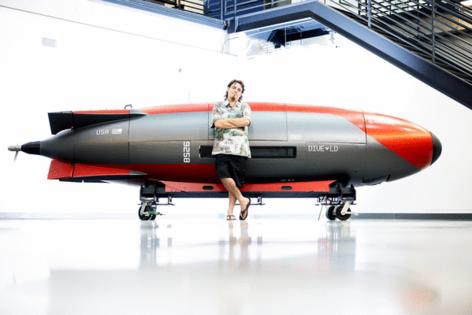Meet Palmer Luckey, millennial slayer of US defense giants
Published in Business News
A red phone sits on Palmer Luckey’s desk at the Costa Mesa headquarters of his military tech company, Anduril Industries.
The phone is a genuine article from the U.S. nuclear command, once connected to the network that led to the bunkers dug into the Rockies west of Colorado Springs that could order up the apocalypse. Luckey owned the red phone before he started Anduril, back when he was only famous for inventing the Oculus virtual reality headset in a trailer in the driveway of his childhood home in Long Beach, then selling that company to Facebook for $2 billion at age 21.
Back then, the phone was just kitsch, a physical piece of history he could gaze at as he worked on VR for a social media company. But after he donated $10,000 to an anti-Hillary Clinton political group in the fall of 2016, then got fired from Facebook a few months later, the red phone changed from a prop to a proposition. Flush with cash, unemployed and annoyed at Silicon Valley, he decided to become a military mogul — possibly the first whose office uniform is a Hawaiian shirt, cargo shorts and flip-flops.
“That was the dream, to be the guy with the red phone who gets The Call,” Palmer, now 31, said in an interview at Anduril’s headquarters.
He founded his new enterprise with four others. One had worked with Luckey at Oculus, but the remaining three came from Palantir, the intelligence analytics software company founded by Peter Thiel, the billionaire tech investor and right-wing political donor. When Thiel founded Palantir in 2003, he named the firm after the magical seeing-stones from Tolkien’s “Lord of the Rings.” Luckey followed in Thiel’s footsteps. Anduril is the elvish name of the reforged sword of Aragorn, king of men and hero of the forces of good in Tolkien’s epic. Translated into English from Quenya, the name means “Flame of the West.” A replica of the sword from the “Lord of the Rings” films hangs on the wall in Anduril’s office.
“The first page of our first pitch deck said that Anduril is a company that will save Western civilization by saving taxpayers hundreds of billions of dollars a year as we make tens of billions of dollars a year,” Luckey said.
“We’re not making tens of billions of dollars a year yet,” he said, “but we’re getting there.”
Six years later, Anduril has signed well over $1 billion in public contracts with the U.S. and allied governments and raised more than $2 billion in venture funding. Last year, it brought in around $500 million in revenue, according to investor presentations reported by the Information.
Of those contracts, $250 million are with the U.S. Border Patrol, which is in the process of deploying a network of 189 Anduril sensor towers to form a “virtual border wall” of semiautomatic surveillance across the U.S.-Mexico border. Another $100 million is with the Australian navy, which hired Anduril to build submarine drones. Its biggest deal came in 2022, when the U.S. Special Operations Command awarded a 10-year, billion-dollar contract to Anduril for counter-drone defense systems that combine sensors, AI software and drones like Anduril’s Anvils, which can physically ram enemy drones to knock them out of the sky.
Luckey’s company has also developed a tube-launched drone with a “loitering munition” model (a.k.a. an exploding drone) and bought a rocket engine manufacturer in Mississippi that makes propulsion systems for hypersonic missiles. In late 2023, it unveiled a jet-powered drone that could be flown multiple times for surveillance missions, or equipped with a warhead for suicide missions. In April, Anduril beat out Boeing, Lockheed Martin and Northrop Grumman in an Air Force competition for a new autonomous fighter drone that can fly alongside manned warplanes like robot wingmen.
...continued
©2024 Los Angeles Times. Visit at latimes.com. Distributed by Tribune Content Agency, LLC.










Comments